#otgw meta
Explore tagged Tumblr posts
Text
so the Tavern Keeper's song "The Beast is Out There" actually spells out the Beast's modus operandi in thorough detail, right? it explicitly spells out that his promises are lies, that the Edelwood trees are grown from his victims, and even that the lantern is "his."
this is all delivered, folktale-as-a-warning-style, to Wirt and Greg when they appear in the tavern as lost travelers — it may even play a part on Wirt seeing through the Beast's trick in the finale. this is a warning conveyed to residents of the Unknown through song — these people aren't oblivious to the Beast; in fact, they're "all" well aware that he's out there and he can't be trusted.
so, with this in mind, why is it so strongly implied that the Woodsman hasn't heard this song?
the Woodsman claims, probably honestly, that he had no idea where the Edelwood trees come from. and he never had an inkling that the Beast's soul was in the lantern all along — maybe a very faint one, but not enough to counteract his denial and desperation. nothing like Wirt's immediate intuition.
so, was the Woodsman's denial just too deep, or had he really never heard the song? had he really never been warned? he's been seen very near to the Dark Lantern tavern, but it seems he never entered, and this has... heartbreaking implications to me.
because clearly, he was feared and ostracized due to carrying the lantern! the Tavern Keeper was superstitious enough about bluebirds, for crying out loud, so of course she'd object to the Woodsman stepping foot in her tavern when "he who carries the lantern must be the Beast!"
but even before the Woodsman became the lantern-bearer — was he never given a proper warning then, either? were he and his family outcasts then, too? if so, was it by choice, or were they just ostracized by superstitious townsfolk before the Beast ever had them in his clutches?
I mean, think about the naming conventions in the Dark Lantern episode — the Tavernkeeper. the Butcher. the Tailor. the Highwayman. and then the Woodsman. the names seem almost designed to call attention to how these characters should be connected — but they aren't. why aren't they?
and, hell — why did the Woodsman's daughter have no one to turn to who'd help her look, when her father went missing? why was there no support for either of them? did they just... never have anyone in their lives besides each other?
anyways, if you can't tell, the Woodsman is one of my favorite tragic heroes.
225 notes
·
View notes
Text
What if I watched a YouTube video that mentioned that every episode in Over the garden Wall there was a pool of water and something drowning in it as foreshadowing for what was actually happening in real life and my life was never the same again. What then?
#what if I saw all those videos about how it is a metaphor for Dante’s inferno and purgatory#throwing thoughts to the void#over the garden wall#otgw wirt#otgw greg#otgw#otgw meta
39 notes
·
View notes
Text
greg otgw is just a fascinating character to me. he's this little kid filled with energy and hope, he says the most random things, and his priorities seem little in the big scale of things. but greg is also someone who truly helps others everywhere he goes.
yet sadly, it seems that greg is often ignored since everyone else is more concerned about the big things. obviously, for example, wirt and beatrice have their own baggage (plus they're the same age i believe?) and so they rely more on each other, but greg is notably left out sometimes.
greg is a character that never gives up, sure, but he does internalize the demeaning things wirt says to him. greg has already internalized that he makes things worse or ruins others' lives, and thus it culminates in him switching places with wirt to save him.
i feel like greg is still not appreciated enough for all of this.
16 notes
·
View notes
Text
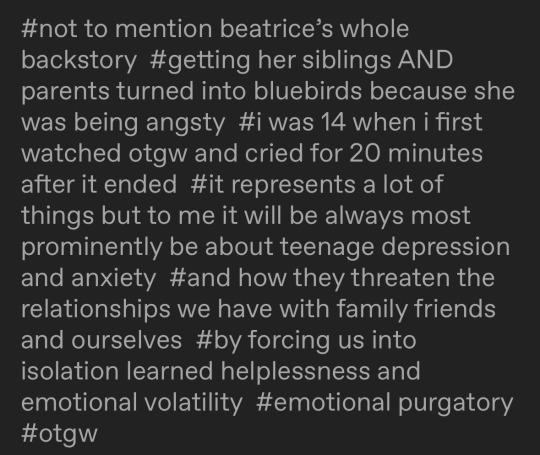
had to add on the prev tags from @lucky-clover-gazette because. yeah
i dont think enough otgw fans talk about the exploration of complex family dynamics that the show manages to weave through pretty much every episode. like the relationship between wirt and greg seems so innocuous in the beginning, just normal aloofness due to the age gap, but as the episodes go on it becomes clear that wirt full on resents greg and actively dismisses him as “his stepdad’s kid,” while greg openly admires/loves wirt and doesnt understand why he wont spend time with him. theres so many little moments that make the lack of reciprocity in their relationship obvious, and it literally takes almost DYING for wirt to understand that he needs to treat his brother better. like holy fuck man ill be shocked if the person who wrote their backstory doesnt have a step/half-sibling cause WOW they got it right
32K notes
·
View notes
Text

A zine to celebrate ten years since Over the Garden Wall first aired on Cartoon Network back on November 3, 2014. The main theme of the zine will be a celebration of the series and a showcase of how much people love it !
SHOP NOW CLOSED !
Twitter/ X: https://twitter.com/OTGWAnniZine Carrd: https://overthegardenwallzine.carrd.co/# Retrospring: https://retrospring.net/@otgwzine
Disclaimer: We are not affiliated with the series, or with cartoon network. This is also a non-profit zine, meaning that all funds will go towards the zine itself and all remaining funds will be donated to a charity of our choice.
95 notes
·
View notes
Text
Sing, lover, sing!
Very surface level and "it's not that deep", but I just rewatched Over the Garden Wall as I do every November, and on this watch-through something new occurred to me.
Wirt does eventually fill the roles the townspeople tried to force him into.
Of course, the whole scene in the tavern with all the townspeople happily accepting their one-note personalities and trying to convince Wirt to do the same was just part of the Unknown being a conglomeration of folktales, and of course Wirt didn't fit a folktale archetype because he isn't actually a folktale character. This isn't about that.
All I was thinking about was, although he more or less accepts the second role offered to him, The Pilgrim, on a wandering quest to find his way home, they weren't too far off in trying to cast him as The Young Lover. They just had the details wrong.
While Wirt's "quest" at that point was just getting him and Greg home, it is later revealed that the whole quest started with him bungling an attempt to confess his feelings for a girl. Wirt's original "quest", the one he prepared for with a costume and a mixtape, was just to confess his feelings for Sarah. Travelling through an unknown fairytale land was not on the agenda until he had already messed that up. So, the "quest" he chose in the first place was "the Young Lover". In his mind, that quest was over once he entered the Unknown, however it did immediately resume upon getting himself and Greg home, so one could argue the Pilgrimage home was part of resuming his first quest.
And as for, "Lover, sing us your love song!" he also eventually does that, just not with Sarah. Because I can think of nothing else to call his duet with Lorna. Of course, this might not have been diegetic as it's played over a montage, but there is no arguing that the Wirt and Lorna duet is not "Wirt's love song", whether or not he sang it aloud or just in his head.
Maybe it's the Unknown slowly reducing the people trapped into it into storybook characters, and if Wirt had stayed there too long he would have fully become one of the roles forced on him, (that is, if he escaped the Beast) or maybe I'm thinking about this too much.
14 notes
·
View notes
Text
I can't tell y'all about the most recent thing I wrote yet, but I can bring back another one of my old fics for the OTGW anniversary!
OTGW is one of those canons that I have felt very little need to write for. It just feels kind of perfect as-is, y'know? I'm more of a meta person than a fic person for that one, really.
That said!
Several years ago, I did write a short OTGW fic for the trick-or-treat exchange, and I wrote it about one of the characters who we didn't get to hear a lot from during the show itself: Sara.
Sara is an interesting character because, like The Beast, we hear a lot about her before we finally meet her. And then... she's so normal, y'know? She's a nice kid. She's good for Wirt. But her existence, like everything else, was heightened in Wirt's Unknown.
So I did think it was fun to bring a little bit of The Unknown to Sara, and to let her come to know it in a way that only she could.
Puddle Jumper Over The Garden Wall | mild Sara/Wirt | PG | 2k words After Sara agrees to watch Jason Funderberker (the frog) while Wirt (the human) goes on vacation, her dreams turn... strange.
8 notes
·
View notes
Text
@ygodmyy20 and @sodasexual, thank you again for sharing this masterpiece with me.
Wirt’s Inferno-- A Comprehensive Guide to Over the Garden Wall as Dante’s Inferno
It is commonly known that Patrick McHale’s Over The Garden Wall is a modern retelling of Dante’s Inferno. Two young brother’s, stuck in purgatory, wander through an Unknown in between as they nearly drown in a lake. The journey they go on mirrors that of Dante’s classic journey deeper and deeper into hell, with each episode representing a different layer.
So, what is Dante’s Inferno, and how did we get here?
Well, as a VERY Italian individual who also happened to grow up in New England, having Italian stories passed down to me from my Nonna and Nonno, as well as an English major who loves analysis and good old fashioned literary parallels, I can’t help but feel like I was somewhat meant to share this. So here we go.
Buckle in for a ride, because we are going to hell and back. Literally.
The Inferno is the first part of Dante’s The Divine Comedy, a 14th century epic poem written by Dante Alighieri. That’s right, Dante is not just the name of the main character. Dante, the author, wrote himself traveling through hell with famous, and even to Dante ancient, Roman poet and philosopher Virgil.
The version of hell we see in the poem is distinct to Dante, just as the Unknown is distinct to Wirt. Is is their vision of what the afterlife, or purgatory, would be.
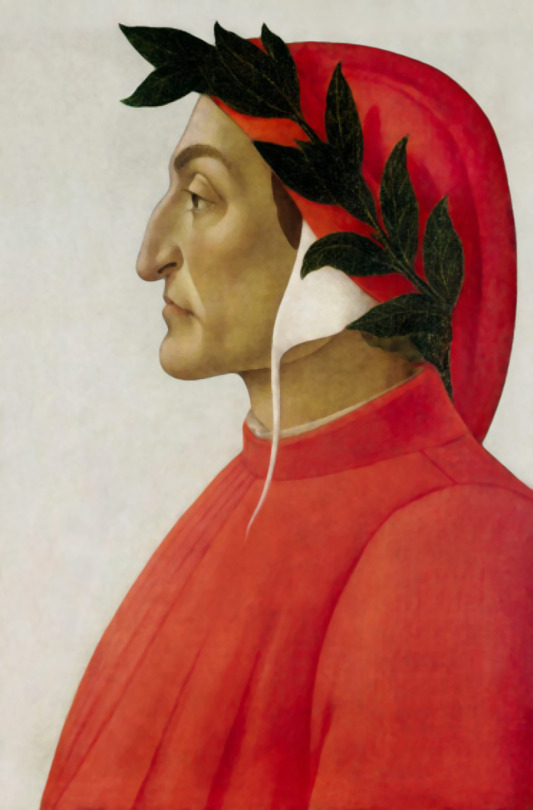
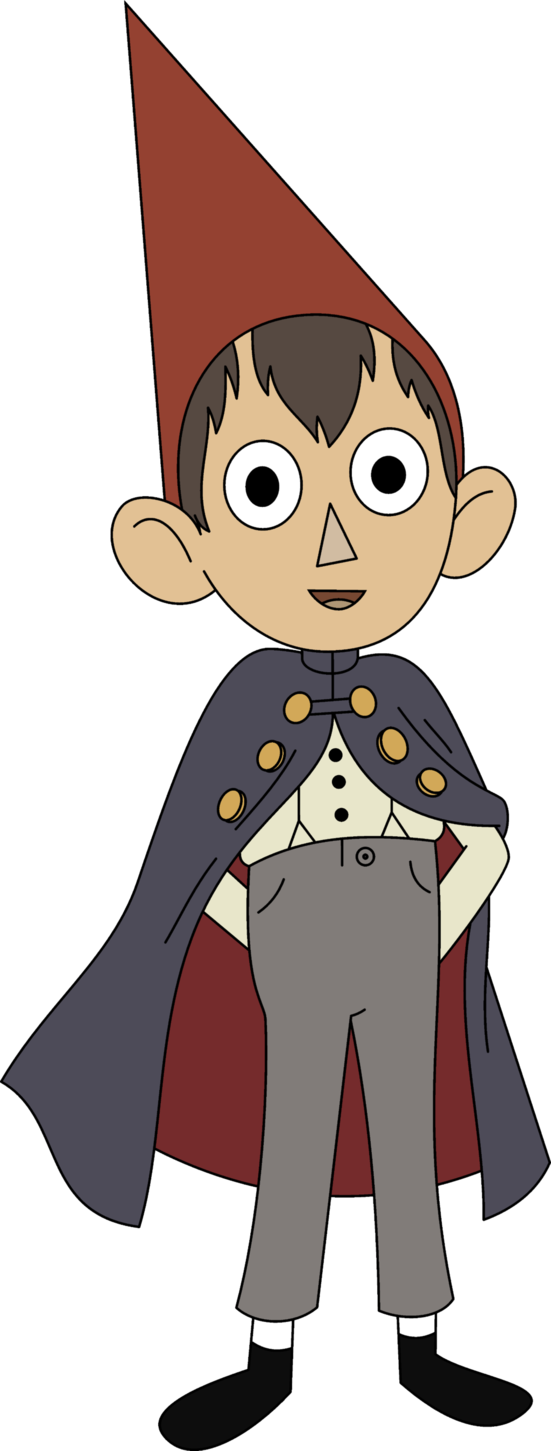
So we have our parallel protagonist. Wirt is our Dante figure. Both are nerdy, insecure, artistic, write poetry, wear red hats, and are in love with a girl.
(Dante is in love with a girl named Beatrice, where our bluebird Beatrice gets her name, and Wirt is technically supposed to be in love with Sarah as the equivalent but as a self proclaimed Wirtrice blog FIGHT ME they both love a Beatrice).
Both, also, have a companion.
The comparisons between Greg and Virgil are less exact than Dante to Wirt. Retellings, are, after all, just that, it’s not exactly the same or there would be no new story. Greg as a younger brother occupies a different relationship role than Virgil, who is a friend and if anything for knowledgeable then Dante in the Inferno. Like Virgil, however, he is musically/ artistically talented. Greg, we can see, gladly breaks out into improvised songs and gives us chart topping #1 hits like Potatoes and Molasses. Now I’m not sure if Virgil was spinning any beats on their way through hell, but both certainly occupy a similar artistic space.
Next, of course, we have Beatrice– who guides our pair further and further into purgatory. Both are redheads, both are adorable and both make me proud to be a pale Italian ginger. (And as previously stated our main protagonist is in love with them).
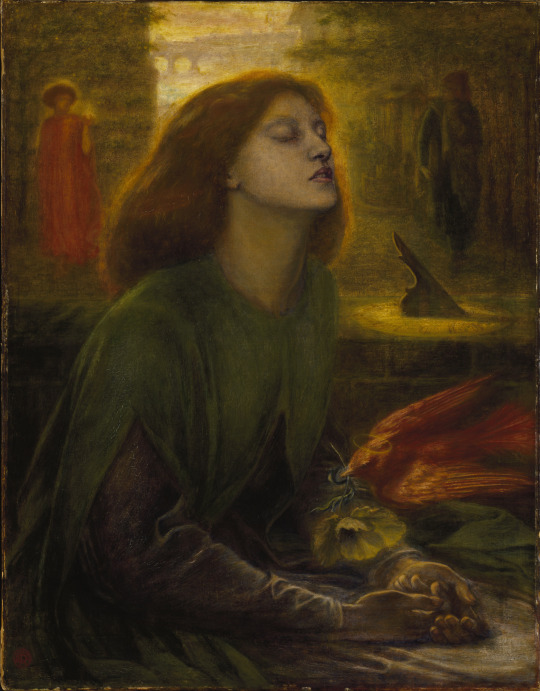
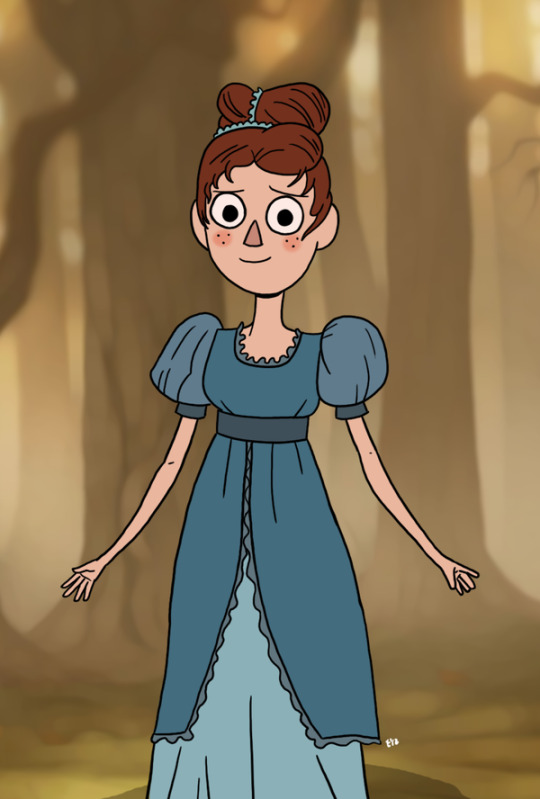
And last but certainly not least, we have the Beast, Over the Garden Wall’s version of Lucifer.
This is more difficult to trace back to the Inferno specifically, Depictions of the devil and Lucifer across various cultures are as old and numerous as my college debt. However, the description of Lucifer in Dante’s epic poem are shockingly spot on to what we see in the Beast’s design
- multi faced
-horned
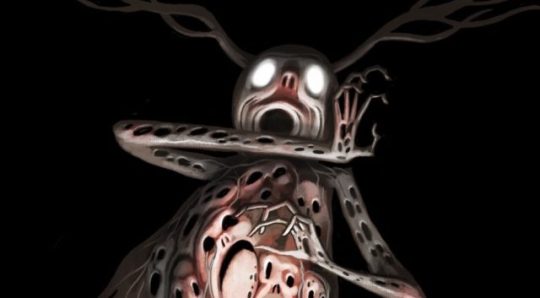
Some pretty clear imagery was pulled here, with tree branches standing in for horn imagery. Both are tricksters, deceivers, and travel through all layers of hell. The Beast does this through, as Greg calls them, turts).
The Beast can most definitely be seen as a general symbol for Lucifer, as many villains are, but there is undeniable inspiration from the Inferno’s specific depiction of the Devil.
Alright, we have our cast of characters. Each character has their counterpart in this retelling, with enough enough clear paralleled characterization and imagery to be a clear reference, while being different enough to be new.
Now, what about the journey? The plot?
The most fundamental commonality between Dante’s Inferno and Over the Garden Wall is that both of our characters take a spiritual, emotional, and life changing journey through some kind of hell, or purgatory. Both of these are tailored to their own unique visions, fears, insecurities, and seen through their lens.
There are ten layers of hell in the Inferno, and it is no coincidence there are ten episodes of Over the Garden Wall. So let’s go through one by one.
Lasciate ogne speranza, voi che continuano leggere questo inviare.
I. The Entrance/ The Old Grist Mill
Dante’s Inferno begins with Dante finding himself in a strange, mysterious forest, unsure of how we got there– precisely how Wirt and Greg’s journey begins. There is a slight difference, though, in that Wirt and Greg begin their journey already inside the Unknown, whereas Dante is in the forest right outside the gate to hell. A gate which reads “Lasciate ogne speranza, voi ch'intrate”– “abandon all hope, ye who enter here”– marks the entrance. The woodsman gives Wirt and Greg the same warning, giving us a sense at the end of the episode that we are finally entering into the true danger of the Unknown.
This is not an official layer of hell, but the entrance, and at this place both characters are attacked by wolf like animals. Dante is attacked by three different creatures, one of them being a she wolf. At the end of the episode, Greg saves the day. Dante, too, is saved by companion– Virgil. The plot of this first leg of the journey is, affectively, the same.
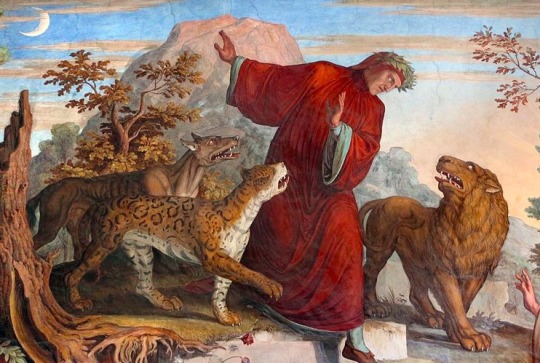
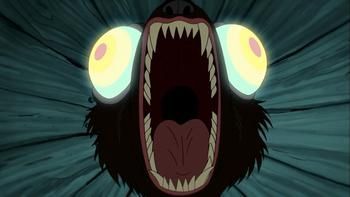
(why the image from the literal family show so much more terrifying than the one from the gothic Italian epic through hell I can’t)
II. Limbo/ Hard Times At the Huskin’ Bee
Limbo is the first actual level of hell, where people who where neither good nor evil are sent to wait. Often this includes pagans who did not believe in God during their lives. They wait for heaven, for salvation and something more. The subtle torture? Is waiting for something that will never come.
In Over the Garden Wall, we go to the town of Pottsfield, a dreary, boring town where we see a distinctly pagan group of pumpkinhead skeletons waiting for the harvest. It should be noted that EVERYONE in the Unknown is supposed to be dead, as seen with Quincy Endicott’s grave being seen in the real world. Yet these are the only skeletons we come across in the entire series.
What are skeletons a symbol of? Death, but also passed time. It’s a mark of time and erosion. The citizens of Pottsfield have spent so long waiting for the harvest– the newfound salvation that will never come– that they have eroded away into skeletons. They have waited, and waited, and waited.
This video here– made by TREY the Explaner on YouTube, also notes that salvation by Christ is also compared to a harvest often, and that Enoch represents the figure of Minos.
This is a video I watched in my research which mostly reaffirmed my findings and observations, but also noted some things I missed. I’m not going to pretend like I made this observation myself, and credit goes to TREY for this next bit.
In the Inferno, travelers encounter King Minos, the Judge of the Damned, when exiting Limbo. He is described a giant, immortal creature who judges those who enter into hell and determines the extremity of their sins. Often depicted with a serpent tail, he wraps his tail around each soul, the number of times dictating which layer they will be sent to.
Enoch, like Minos, is the leader and judge in this layer. He is larger than all the other townsfolk, who overtly states to With, Greg and Beatrice that he has to “punish them for their transgressions” . He sentences them as they exit, just like Minos. Enoch’s design is also large, and serpenty. Enoch has streamers and hisses, as TREY points out in their video.
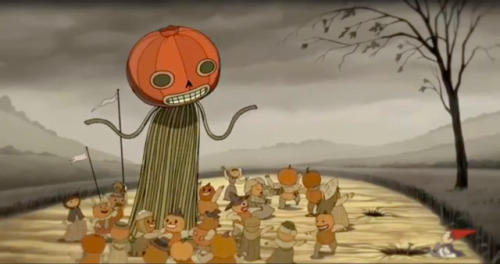
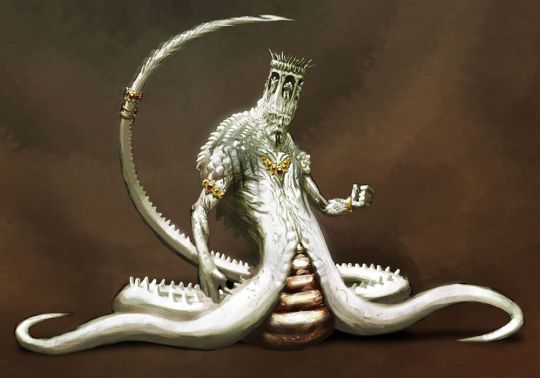
The similarities are actually uncanny when you really look at it.
Once again, the Enoch observation is brilliant but NOT mine. This is from TREY the Explorer’s video, which was posted over five years ago, and you should go and support it through this link right now.
III. Lust/ Schooltown Follies
The first level where people are punished, the level of lust punishes those who commit just that, lust. And the concept is all over the place in this episode, with Ms. Langtree– who LITERALLY sings a song called “Ms. Langtree’s Lament” and spends the entire episode yearning.
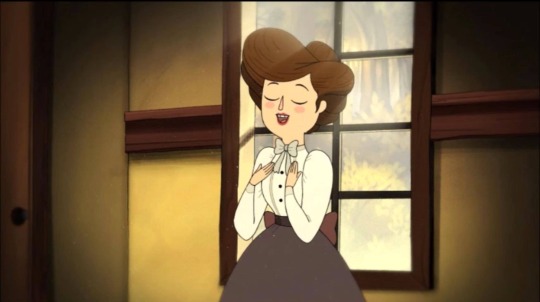
Oh, Ms. Langtree, you lustful sinner you.
Truth be told, lust is my least favorite sin/ level in the Inferno. I’m ace as, well, hell, and I often can’t relate. I thought this would be my least favorite episode and parallel due to this, and yet it’s not.
In the Inferno, souls are blown back and forth by a giant storm. This is meant to symbolize how lust blows people back and froth aimlessly in life. We see this with Ms. Langtree throughout the entire episode. She’s spiraled into a depression, thrown around emotionally to the point she can hardly stand.
She is, emotionally, blown back and forth. In fact, whenever we enter the school in the episode we hear wind sound effects. The school is the level of lust, and Ms. Langtree it’s main soul.
IV. Gluttony/ Songs of the Dark Lantern
This is probably one of my favorite episodes in regards to following the Inferno, truth be told. Here, gluttons are punished for being gluttonous– overindulgent, wasteful, and over consume. One of the most common depictions of gluttons is wasting away in a tavern eating and drinking, so it makes sense that this episode’s prime location would be an inn.
And what do we see? Overindulgent inn customers, who from the moment Wirt and Greg arrive boast about their lives. We also see Greg indulge in large piles of food, leaving behind stacks of plates. He is constantly eating throughout this episode.
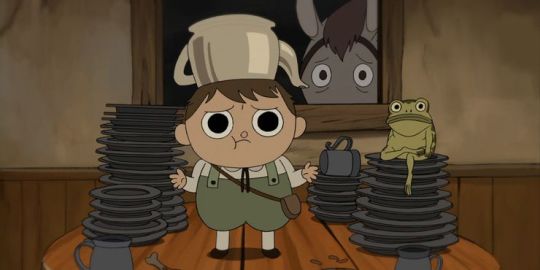
There is more food in this episode than any other one, though it should be noted the people at the tavern are never seen eating it. This is a reference to the punishment of gluttony in the Inferno– though they ate excessively in life, they cannot eat in hell.
Yet that is hardly where the gluttony parallels stop.
For one, the most notable characteristic of Gluttony is that it is constantly raining, and outside of our quaint little inn it is pouring. We see this emphasized when the action is taken outside.
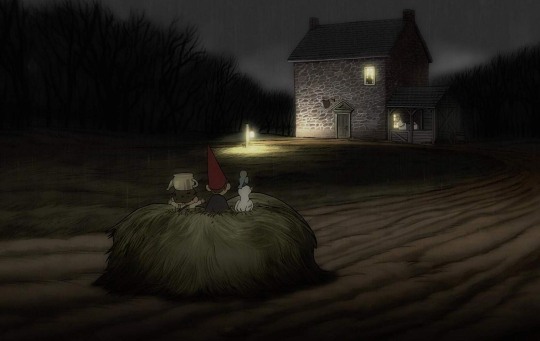
This circle is also guarded by Ceberus, a three- headed dog from Greek Mythology, and we see a dog guarding the inn by blocking the door.
It is also important to note that this is the episode where Wirt is labeled as “the pilgrim”. This is a direct reference to him being Dante, as Dante’s journey through hell was said to be a “great pilgrimage”.
V. Greed/ Mad Love
The circle of Greed corresponds to the episode about rich people whose mansion’s are so big they can’t even tell that they’re connected– what a surprise!
The greed and harboring of wealth is fairly overt in this one, needless to say. In the Inferno, those guilty of greed are forced to push bags of riches for eternity, unalloyed to keep any of it. Endicott is a perfect example of greed. He continues to harbor wealth, believing it will make him happy.
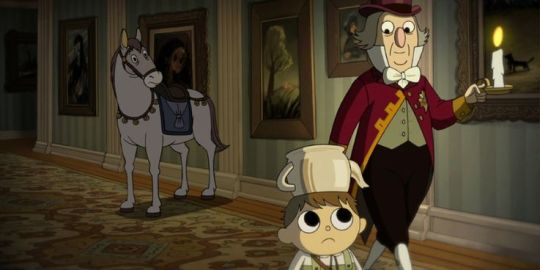
Yet his giant mansion does not make him happy, and directly leads to the very thing torturing him (the “ghost”). The punishment here is not as direct as in the the other episodes, bur rather more metaphorical. He is emotionally empty and tortured by his cold, money driven exploits.
Another important plot point in this episode is the need to acquire two cents in order to ride the ferry to Adelaide’s. This is one of the more blatant references to the Inferno, where, like in Greek Mythology, Dante and Virgil must pay two coins to the ferryman Charon to ride across the river Styx and reach the next level of hell.
VI. Anger/ Lullaby in Frogland
At first glance, this seems like one of the more abstract episodes to compare to the Inferno. It’s where those who were aggressive, violent, and full of rage are punished. We are on a ferry with bassoon playing frogs.
However, the episode manages to draw some fantastic parallels. The circle of Anger in Dante’s tale is represented by a muddy, swampy wetland. Dante and Virgil do not have to pay to cross the river like most, and take a boat across. Wirt, Greg and Beatrice also do not pay the two coins, since Greg threw them out, and catch a ride on a ferry through the muddy swampland.
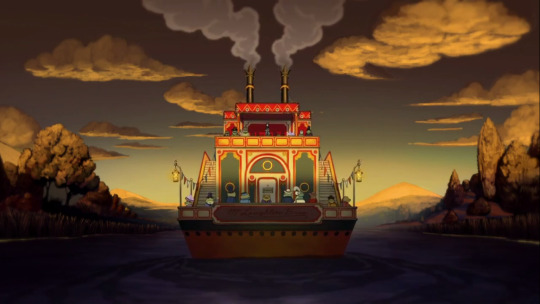
I guess Endicott was right, Greg does have some sense. And we end all rolling in the mud, just like the souls in Anger.
Speaking of which, you know what else there is a lot of in this episode? Anger.
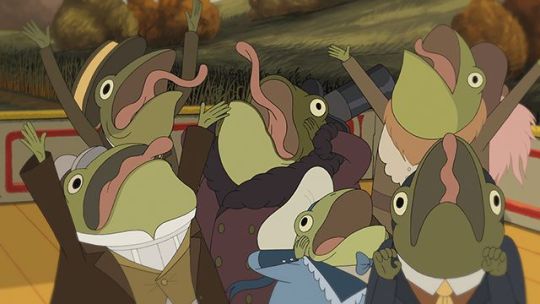
Anger when there is no bassoon player. Anger and a chase with the frog police. Wirt’s anger when he finds out Beatrice lied to them.
The episode is the central turning point of the series, and it works beautifully with this layer of hell. The exit of Anger in the Inferno is the City of Dis, whose walls separate the passive sins, from the active ones. This is the point we have reached in our narrative with the reveal of Beatrice’s betrayal as well.
I would also like to include another addition from TREY’s video at the end of this section, which I did not observe or come up with myself, which is that in the City of Dis, Dante is confronted by three furies. Like the fates, they are old hags.
And who do we get in this episode? Adelaide. An old hag, whose scissors channel imagery of the fates in Greek Mythology, who use scissor to cut the string of people’s lives.
VII. Heresy/ The Ringing of the Bell
Heresy, one of the worst sins one could commit in Dante’s time, is the punishment of practicing any faith outside of, in this case, Catholicism (though broadly speaking it is the practice of any religion outside of the accepted one in society, which depends on the context). They are punished by being constantly burned or set on fire.
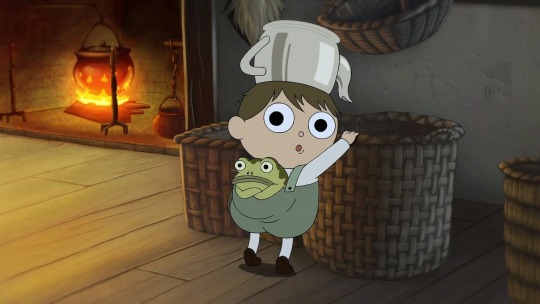
In this episode, there is not only an array of candles around the house, but an emphasis on the fire by Auntie Whispers. The entire episode has a pagan, witchy feel– these same candles are arranged in what looks like ritualistic way, perhaps to try and get the demon out of Lorna.
Which brings me to the most obvious point and reference, in my eyes.
The plot of the entire episode is literally that of an exorcism, casting a demon out of a young girl.
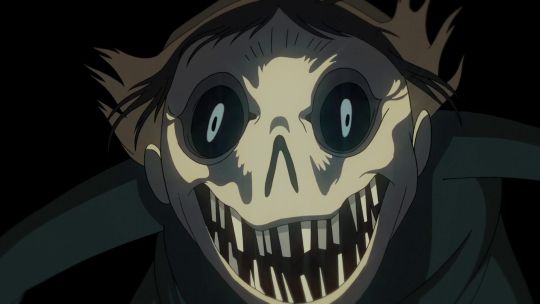
If that is not a theme of heresy, I don’t know what is. The aesthetic of this episode is entirely what Dante’s hell considers heresy, and the plot of driving out a demon an all too familiar Catholic narrative.
Magic, sorcery, and witch imagery are more prevalent in this episode than ever, and though more abstract than other episodes I believe the parallel could not be clearer.
VIII. Violence/ Babes in the Wood
Violence, though fairly self explanatory, is is a bit complicated in the Inferno. It’s broken up into parts, or rings– violence against others, violence against oneself, and worst of all, violence against God.
The punishments in the circle of Violence are gruesome ones– those in the first ring are left to drown in the boiling blood of the River Phlegethon, since they reveled in blood in life. In the Inferno, Dante and Virgil cross the river to enter the Wood of Suicides, where those who took their own lives are left to transform into trees.
Oh gee, where have we seen this before?
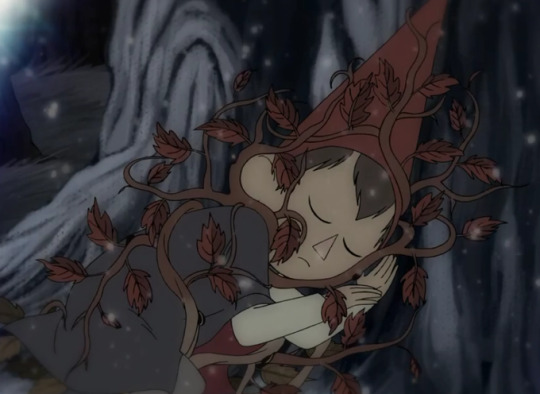
The tree imagery is arguably the most blatant reference to the Inferno in the entire series. After floating down a river, the boys wander through the woods. Wirt, having given up in despair, lies down and begins to turn into a tree. They have floated down the River Phlegethon, and entered the Wood of Suicides.
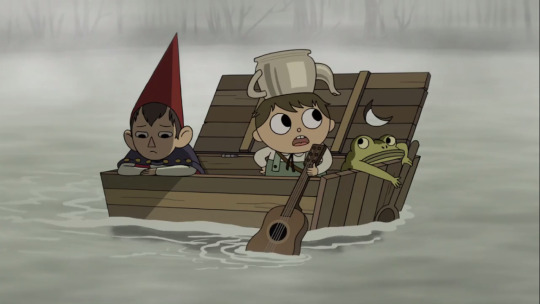
There is a lot more detail and nuance to the rings of circle of Violence in the Inferno, but the episode follows the basis of Dante’s journey through it quite well. Wirt’s attitude and sadness, his laying down and almost turning into a tree, can even be read as an allegory for suicide.
IX. Fraud/ Into the Unknown
Like episode 5, our flashback episode is one of the more difficult ones to parallel to it’s counterpart in Dante’s Inferno. In the Inferno, the circle of Fraud is complex and made up of various ditches, or bolgias. What’s interesting, however, is that the episode of Fraud is the one what takes place in the real world.
Fraud is deception, lying, and manipulation, and not only does the episode take place on Halloween– a night full of fraud where everyone pretends to be someone or something they are not– Wirt himself is a fraud. He never shows his true self, due to his insecurity, and in an attempt to win over Sarah.
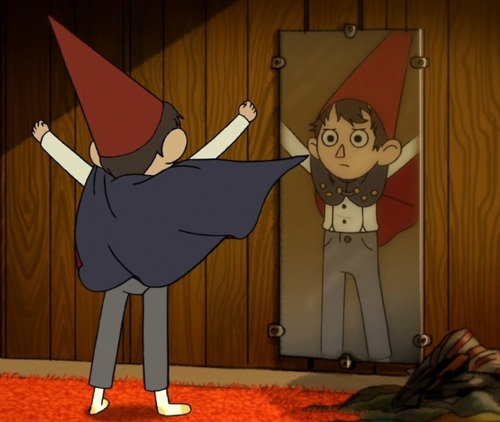
The episode follows a bunch of teenagers. And what bigger frauds, or pretenders putting on an act, are there than teenagers trying to survive in a public high school?
Thieves are amongst those punished in this circle, and this is the episode where Greg reveals he stole his rock fact rock.
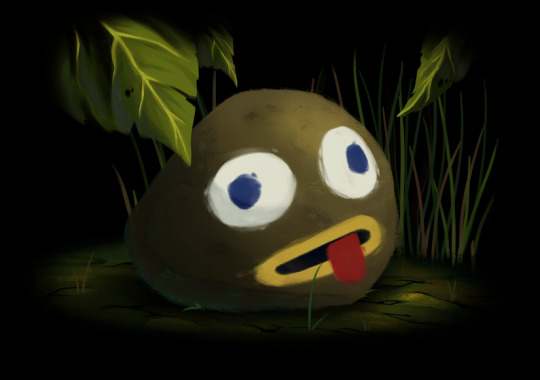
Both Wirt and Greg have committed sins applicable to this circle. The punishment for this circle is falling down a pit or trench into darkness. And that is precisely how this episode ends– Wirt and Greg falling down into a pit of darkness.
TREYs video also points out that Sarah’s costume could be symbolic to the winged creature Geryon, whom Dante and Virgil encounter at the end of this circle. Like a bee, Geryon is winged with a stringer, though he was a humanoid upper body. Geryon leads Dante and Virgil deeper in hell, while Sarah arguably leads Wirt and Greg to the Unknown. She is the reason they end up there in the first place.
Lastly, there is the “eat your dirt” comment from Beatrice, which when researching and rereading the Înferno to look for similarities I immediately thought was a nod to one of the worst punishments in Fraud– deceivers who told lies being forced to eat human waste, as it represents what came out of their mouths during life. This, to my surprise, was also noticed by TREY in their video, and discussed. It is a subtle nod, yet this imagery being in the episode which corresponds with this circle, and never being brought up again, cannot be a coincidence.
X. Treachery/ The Unknown
The worst layer of hell, where Lucifer himself is found due to betraying the highest power of all, God himself, Treachery is depicted in the Inferno as a cold an barren wasteland. This is a stark contrast to the pit of fire hell is commonly described as. This is because Lucifer’s giant wings beating freeze everything to ice and cause frigid wind gusts. Like in episode three, the weather in the final episode of Over the Garden Wall parallels it’s equivalent in the Inferno.
It is snowy, cold, barren, and we open with Beatrice being blown around in a giant windstorm. And in this episode, like in this circle, we find the Beast.
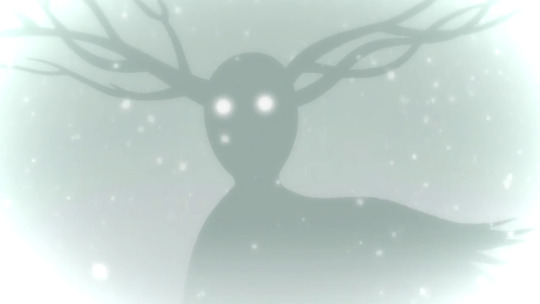
People in the circle of Treachery are punished being frozen, looking upward at the world but unable to move or ge tout of the eternal cold. This is precisely what the Beast does to Greg to fuel his lantern.
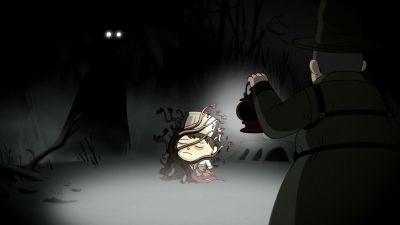
In the end, both Dante and Wirt contort the Beast, or the Devil, in this frozen tundra, and eventually escape and return home. Their journey’s have changed them however– spiritually, emotionally, and in maturity. They have literally been to hell and back.
And so, our retelling of Dante’s Inferno comes to an end.
Patrick McHale’s masterpiece is more than a retelling of Dante’s epic poem– it is stooped in American colonial folktales, German fairytales, and more. However, the Inferno is most definitely it’s bones, it’s outline, and a core part of what makes this stunning piece of art work.
#dante's inferno#over the garden wall#otgw#otgw meta#i really need to read dante's inferno#i have no excuse anymore#at the very least i'd like to add some analysis of lust here#also i did not fucking know christopher lloyd was still acting#and was overjoyed to hear his voice again#the VA work is lovely in general on this series#i am richer for having seen it
1K notes
·
View notes
Text
honestly though i like that the teenagers in wirt and greg's hometown aren't mean. they're pretty cool with wirt (and greg), jason funderberker isn't the stereotypical jock bully, he's literally just some guy lol.
8 notes
·
View notes
Text
@chai-coffee-cat I was going to put this in the replies to my post, but then it turned into it’s own little essay. 😆 I’m far too passionate about this show lol
Your reply to my post was that you thought the Woodsman’s daughter had been a lost soul turned to edelwood. Here’s my own reasoning of why that was never the case.
Remember at the very end of the show when we see the Woodsman sitting on the porch of his old home? And then his daughter walks out the front door and finds him there? She wouldn’t have been there to do that had she actually been an edelwood tree. The souls who were turned into trees to feed the Lantern didn’t return to flesh and blood just because the Beast’s life-force was snuffed out, so she wouldn’t have been there had she ever been an edelwood tree.
The Beast tricked the Woodsman into thinking he put his daughter’s spirit in the Lantern, similarly to how we saw the Beast try to trick Wirt. But there is a key difference. I don’t think the Woodsman’s daughter ever came close to becoming an edelwood tree like Greg. I don’t think she ever came close to being dead. I think that there was some kind of accident--possibly even orchestrated by the Beast--that made it seem like the Woodsman’s daughter died. Something where the body could not be recovered, like drowning in a swift river or falling through the ice on a pond or losing her footing at the edge of a ravine. Basically, the Beast’s ruse culminated in that trope where a person is nowhere to be found but there’s a piece of their clothing lying near a dangerous place, and the other character just assumes the worst.
So.
The Beast took advantage of the Woodsman’s desperation to have his daughter back by lying about putting her spirit in the Lantern. And then the Beast just kept feeding the Woodsman’s guilt and grief to keep him away from the home where the Beast knew his daughter actually was, safe and well (having no idea where her father was or if HE was alive, I might add). The evidence for this is in one of the Beast’s final ploys to get the Woodsman back under his control. He says, “Are you really ready to go back to that empty house?!” And we see how deeply that affects the poor Woodsman! It’s the only time we see him cry!
The Beast had manipulated the man and fed his despair to such an extent that the Woodsman couldn’t even bring himself to go back to the home he had shared with his daughter. He instead chose to roam the forests of the Unknown alone, supposedly keeping his daughter’s spirit alive (even though “her flame” never reacted with any sort of sentience). He preferred to have this one-sided relationship with an inanimate object--and this horrible arrangement with the Beast--over going back home and accepting his daughter’s death.
The ultimate tragedy in all this being that, if the Woodsman had been able to bring himself to go home before the events of ep. 10, he would have immediately found his daughter alive and well. The ultimate tragedy in all this being that he unwittingly spent years keeping the Beast alive, resulting in more lost souls turned into trees, burned into nothing.
The ultimate tragedy in all this being that “he who carries the Dark Lantern must be the Beast.”
#chai-coffee-cat#snafuresponds#snafuwrites#otgw#otgw meta#otgw the woodsman#otgw the beast#over the garden wall
85 notes
·
View notes
Text
Why the HECK did it take me this long to realize that the entire reason the Beast is a shadow is because he follows the lantern and his body is the shadow cast by the light of his soul?
I was just caught up in the fact that he looked epic as hell
235 notes
·
View notes
Text
🤣 🤣 🤣 ROFLMAO YEAH
wirt from otgw really is one of the best written teenage characters ever i think. like. he's 15-16-ish and wants people to take him seriously SO badly, but he also struggles to take responsibility for most things. he's dripping with anxiety. he overcomplicates everything in his mind but sometimes he has lapses of impulse. he can be surprisingly blunt when he's angry. he can't help but hate his little half-brother (and stepdad) out of spite and it takes both of them nearly dying for him to start working through those feelings. he's really creative but he keeps his interests in poetry and the clarinet a secret because he thinks it's fucking embarrassing. he reads real estate magazines and knows a lot about architecture and interior design, which is such a random little detail but i love it. he's self-conscious and lowkey suicidial and always assumes the worst in other people's view of him, but BASICALLY EVERYONE BACK HOME LIKES HIM, including the girl he has a massive crush on, and he just can't see it because he never makes an effort to reach out. every minor stepback feels like the end of the world to him. he has no idea who he is or what he wants.
13K notes
·
View notes
Text
So when r we gonna talk about OTGW and capitalism???
Because the Woodsman isn’t toiling away collecting oil from exploited children and becoming an embodiment of The Beast in a colonial New England setting for all of us to collectively ignore the implications there.
#i have more to say on this at some point in the near future#but for real#with all the analysis people have done i haven’t found anything on this#otgw meta#otgw
48 notes
·
View notes
Text
Something i never picked up on until my most recent rewatch of Garden Wall:
Beatrice is really melodramatic.
Think about it. With great lines such as:
“And then what are you gonna do? Just wander around, this way and that way, through the woods, forevermore~?”
“I guess in some ways, I’m trying to get home too~...” (Worth noting that even Wirt points out how vague and dramatic that statement is)
[in a haughty tone of voice] “I am Beatrice. These two sweet kids and I got a bit lost in the-” (i have a feeling that if she were a human in this scene, she would curtsy, albeit very smugly)
[upon being faced with a minor, insulting inconvenience] “Curse you lady, curse you! You’ll die someday and I’ll laugh, LAUGH!” [cue forced, exaggerated laughter]
The second time she encountered the boys, she put on theatrics with the whole “Woe is me, my tiny useless avian body is helplessly stuck in a blackberry bush, don’t ask how I ended up in this situation, won’t you please help me~?” shtick.
Either some of her era’s expectations for the way women ought to act must have stuck, or she’s actively mocking and parodying them. It’s just another one of the many ways in which Beatrice is a wonderfully multifaceted character, because a majority of the time, she’s blunt and a bit crude.
Also, having ten younger siblings to compete with, it’s plain to see that Beatrice doesn’t get much attention at home (unless she’s getting into trouble), hence the theatrics.
#otgw#over the garden wall#otgw Beatrice#otgw meta#otgw analysis#otgw headcanons#it's true: i love Her more with each passing minute
255 notes
·
View notes
Text
i’m normally not a fan of the “it was all a dream!” ending, but i think that the reason that i don’t hate it in otgw is because just because it was a “dream” to wirt and greg and they ended up back in their own modern time in the end doesn’t mean that it’s not a real place where real things happened.
it’s not like the wizard of oz movie where oz is just a dreamland inhabited with versions of the people in dorothy’s life. life is still trucking on in the unknown with or without them.
61 notes
·
View notes
Text
Yeah
when they got "character who made an undeniably terrible decision but man i dont know what i would have done either" at the function
55K notes
·
View notes